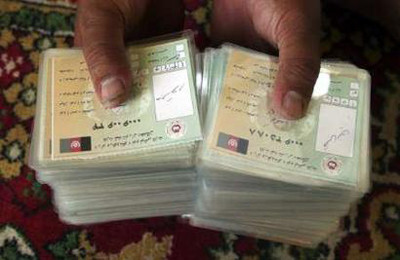Buried outside his house near the Afghan capital, Haji Rozuddin keeps hundreds of fraudulent voter registration cards to sell to anyone wanting to vote in next month’s presidential election. He would prefer it, however, if they were used to support his favorite candidate, incumbent Hamid Karzai.

Afghan man, Haji Rozuddin shows fraudulent voter registration cards in Logar province. Buried outside his house near the Afghan capital, Haji Rozuddin keeps hundreds of fraudulent voter registration cards to sell to anyone wanting to vote in next month's presidential election. Picture taken July 1, 2009. REUTERS/Hamid Shalizi
“I’ll sell them in favor of any candidate. If someone says they’ll use them in favor of Karzai, I’ll be happy,” said a laughing Rozuddin, dozens of illegal voter registration cards scattered across the living room floor of his mud-brick house in Logar province, an hour’s drive south of the capital, Kabul.
Western donors are footing the $223 million bill for the August 20 election, which is being contested against a backdrop of increasing violence and record death tolls for foreign troops.
But observers including the International Crisis Group fear the poll could be marred by fraud. Rozuddin’s living room floor appeared to be testament to those fears.
Most of the voter cards on his floor were for female voters — genuine cards but filled in with fake names. The cards do not contain photographs because women, for cultural reasons, are not obliged to provide one, making it easier to misuse the cards.
Rozuddin says he got the voter registration cards from a friend who works at a provincial election office and that they had hundreds of cards, kept in a plastic bag buried next to a small stream that runs by his house, for sale at $5 each.
Sima Samar, chairwoman of the Afghan Independent Human Rights Commission, said there had been suspiciously high levels of female registration in Logar province and southern parts of the country where conservative traditions discourage women from traveling and interacting in public.
“If they were able to get the registration cards, then they will be able to vote with them as well,” Samar told Reuters.
Habib Rahman, head of the provincial council in neighboring Ghazni province, said fraud during the registration process had been a huge problem. One person could collect hundreds of cards often with the assistance of district officials, he said.
“Even district chiefs are involved. They got thousands of voter cards from the provincial registration centers in the name of residents but kept them all for selling,” Rahman told Reuters.
Zekria Barakzai, deputy chief electoral officer for the Independent Election Commission (IEC), emphatically denied allegations electoral officials were involved.
Voter registration for the upcoming presidential election was carried out at the end of last year and the beginning of 2009.
But registration was only for those voters who had reached the voting age of 18, had returned to Afghanistan since the last election in 2004 or for those who had lost their old cards.
There is no official electoral register in Afghanistan. Election officials say they had discussed the idea two years ago but would not have been able to complete it in time.
Barakzai said it was possible people registered more than once by using different forms of identification at different registration centers.
But he said a person will still only be able to vote once because their fingers will be stained with ink before voting. Scores of local and international observers will also be on hand.
One Western election official in Kabul who asked not to be identified said “the system is not perfect but under the circumstances it is the best it can be.”
(Additional reporting and writing by Jonathon Burch; Editing by Paul Tait)



